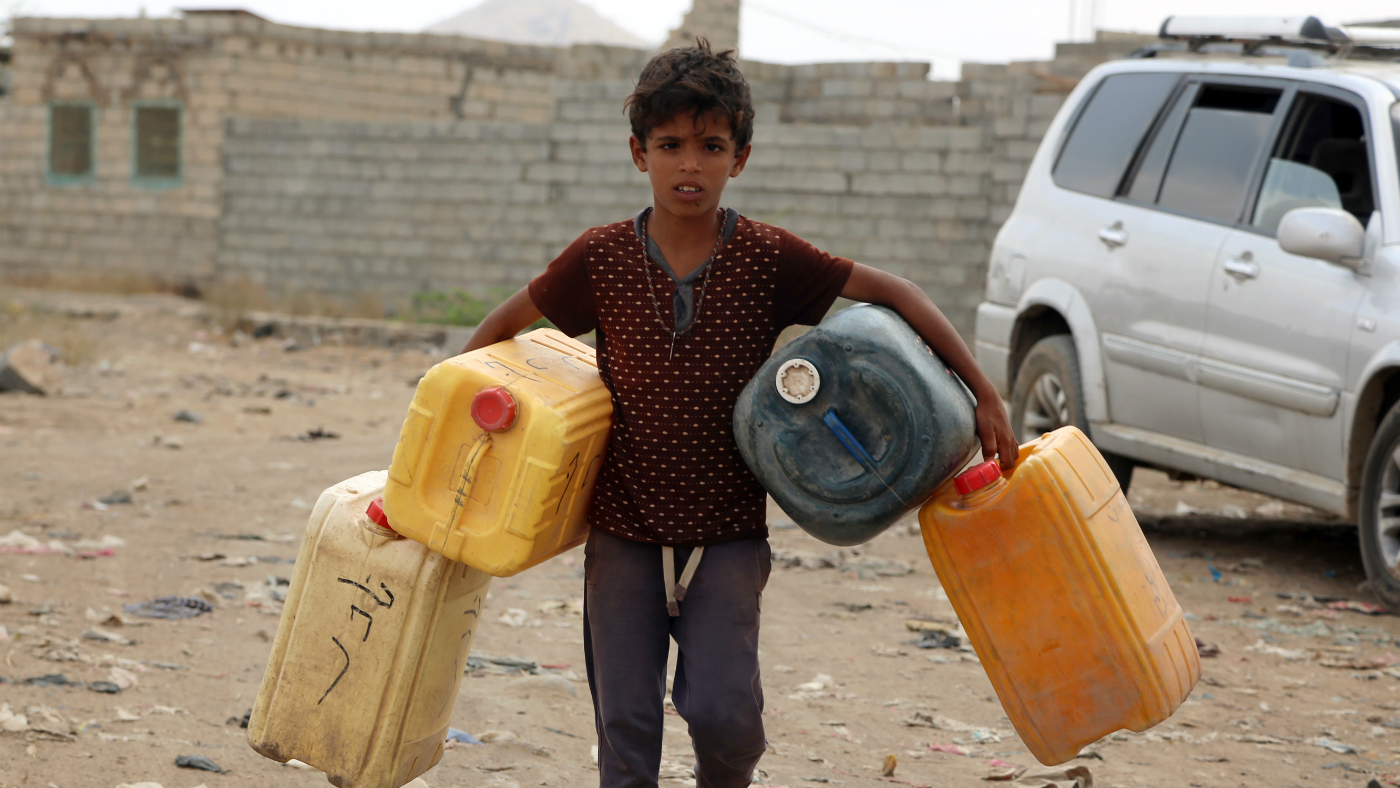Why attack on Yemen’s Hudaydah port risks a national catastrophe
Newly launched assault on vital maritime gateway described as ‘Yemen’s Aleppo’

A free daily email with the biggest news stories of the day – and the best features from TheWeek.com
You are now subscribed
Your newsletter sign-up was successful
Saudi and Emirati-backed forces have begun an assault on the Houthi rebel-held Yemeni port city of Hudaydah.
The attack is expected to lead to a protracted and bloody confrontation, putting “literally hundreds of thousands of people… into a life-threatening situation,” Lise Grande, United Nations humanitarian coordinator for Yemen, told US radio station NPR.
Yemen has been devastated by civil war, with the Houthi movement trying to take control of the country and forcing President Abdrabbuh Mansour Hadi to flee abroad. Forces loyal to Hadi’s government, and allied foreign states, have been fighting the Houthis, with jihadist militants also taking advantage of the chaos.
The Week
Escape your echo chamber. Get the facts behind the news, plus analysis from multiple perspectives.

Sign up for The Week's Free Newsletters
From our morning news briefing to a weekly Good News Newsletter, get the best of The Week delivered directly to your inbox.
From our morning news briefing to a weekly Good News Newsletter, get the best of The Week delivered directly to your inbox.
The Red Sea port handles most of the country’s commercial imports and aid supplies, and is a lifeline for some eight million Yemenis - around a third of the population.
Bombing began after Iranian-backed Houthi rebels “ignored a deadline set by the exiled government to withdraw by midnight” on Tuesday, says the BBC.
UN Yemen mediator Martin Griffiths “had been holding talks with the Houthis to hand over control of the port to the United Nations”, in an attempt to forgo any attack, Yemeni political sources told London-based research organisation Middle East Monitor.
The Saudi-owned Al Arabiya network reported that the “liberation” of Hudaydah began with a large-scale ground assault supported by air and naval cover. The coalition “have accused the rebels of using the port to smuggle in Iranian weapons, which the rebels deny”, says the BBC.
A free daily email with the biggest news stories of the day – and the best features from TheWeek.com
Reports over the weekend suggested the Lower Al-Jahah area, south of the city, had been captured in fierce fighting. Local experts told The Guardian that an attack on Hudaydah would be “Yemen’s Aleppo”.
Meanwhile, diplomats in the region told The New York Times that “only pressure from Washington, which sells tens of millions of dollars of weapons to the United Arab Emirates and to Saudi Arabia every year, could stop the assault”.
Although the Trump administration has developed close ties with Saudi Arabia and the United Arab Emirates, “many members of Congress and international diplomats blame the two countries for exacerbating what the United Nations says is the world’s worst humanitarian crisis, with indiscriminate attacks that have been responsible for thousands of civilian deaths”, adds the newspaper.
This week US Secretary of State Mike Pompeo issued a brief statement about the Trump administration’s willingness to address the “security concerns” of the coalition leaders while “preserving the free flow of humanitarian aid and life-saving commercial imports”.
The statement was a significant departure from previous American policy and was “a yellow light to the emirates: proceed but with caution”, says The New York Times’s Gregory D. Johnsen.
A major escalation in fighting in Hudaydah is likely to kill the prospect of any peace talks in the short-term, and to “condemn the children of Yemen to yet more misery”, says Save the Children.
“This major escalation in violence puts 170,000 children at risk of death or injury and could cause the biggest single displacement of people since 2015, pushing Yemen towards a full-blown and entirely man-made famine,” the charity adds.
-
 The ‘ravenous’ demand for Cornish minerals
The ‘ravenous’ demand for Cornish mineralsUnder the Radar Growing need for critical minerals to power tech has intensified ‘appetite’ for lithium, which could be a ‘huge boon’ for local economy
-
 Why are election experts taking Trump’s midterm threats seriously?
Why are election experts taking Trump’s midterm threats seriously?IN THE SPOTLIGHT As the president muses about polling place deployments and a centralized electoral system aimed at one-party control, lawmakers are taking this administration at its word
-
 ‘Restaurateurs have become millionaires’
‘Restaurateurs have become millionaires’Instant Opinion Opinion, comment and editorials of the day
-
 Corruption: The spy sheikh and the president
Corruption: The spy sheikh and the presidentFeature Trump is at the center of another scandal
-
 Epstein files topple law CEO, roil UK government
Epstein files topple law CEO, roil UK governmentSpeed Read Peter Mandelson, Britain’s former ambassador to the US, is caught up in the scandal
-
 Iran and US prepare to meet after skirmishes
Iran and US prepare to meet after skirmishesSpeed Read The incident comes amid heightened tensions in the Middle East
-
 Israel retrieves final hostage’s body from Gaza
Israel retrieves final hostage’s body from GazaSpeed Read The 24-year-old police officer was killed during the initial Hamas attack
-
 China’s Xi targets top general in growing purge
China’s Xi targets top general in growing purgeSpeed Read Zhang Youxia is being investigated over ‘grave violations’ of the law
-
 Panama and Canada are negotiating over a crucial copper mine
Panama and Canada are negotiating over a crucial copper mineIn the Spotlight Panama is set to make a final decision on the mine this summer
-
 Why Greenland’s natural resources are nearly impossible to mine
Why Greenland’s natural resources are nearly impossible to mineThe Explainer The country’s natural landscape makes the task extremely difficult
-
 Iran cuts internet as protests escalate
Iran cuts internet as protests escalateSpeed Reada Government buildings across the country have been set on fire